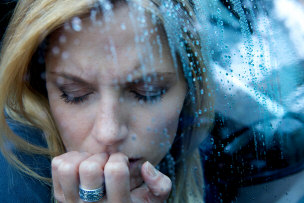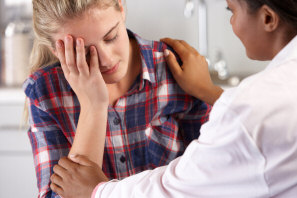Depression Facts, Symptoms & Treatment
What is Depression?
 Depression is when an individual feels extremely sad and lonely. This state
of mind may be caused by different life events including loss of a loved one,
low self-esteem and even life’s struggles. Depression could be genetic. However,
not all individuals who have family history of depression are depressed. Some
types of depression may cause someone to find it hard to accomplish simple tasks
each day. If this condition is not treated immediately, symptoms can worsen and
will last longer, even years and may lead to suicide. Depression is when an individual feels extremely sad and lonely. This state
of mind may be caused by different life events including loss of a loved one,
low self-esteem and even life’s struggles. Depression could be genetic. However,
not all individuals who have family history of depression are depressed. Some
types of depression may cause someone to find it hard to accomplish simple tasks
each day. If this condition is not treated immediately, symptoms can worsen and
will last longer, even years and may lead to suicide.
Symptoms of Depression:
- Problems in concentrating, decision-making and remembering things.
- Fatigue.
- Feeling worthless, helpless, guilty and hopeless.
- Sleeping problems. This includes either sleep deprivation (insomnia) or
excessive sleeping.
- Irritable and always angry.
- Activities which were once enjoyable becomes uninteresting.
- Abnormal appetite. This includes either or both loss of appetite or
overeating.
- Pains in different parts of the body that cannot be eased by treatment.
These pains may include cramps, headache or digestive problems.
- Sadness, anxiousness and feeling empty lasts for days.
- Suicide attempts or constant thoughts of suicide.
10 Warning Signs of Suicide:
- Abrupt alteration of mood, from being extremely sad to appearing calm
and happy.
- Constant thinking or talking about death.
- Extreme sadness, worsened trouble sleeping and more abnormal eating
habits.
- “Death wish”. Attempting dangerous acts that could lead to death.
- Loss of interest.
- Mentioning worthlessness, hopelessness and helplessness.
- Apologizing to people and fixing relationships.
- Constant wishing that he or she would better be gone, or not born at all.
- Mentioning suicide.
- Giving valuable possessions to other people.
Depression in Teens
 One out of eight young adults suffers from depression. More than 90% of teens
commit suicide because of mental disorders including depression. Up to 15% of
teenagers around the world suffer from major depression (also known as clinical
depression) at one point of their teenage lives. Parents may notice a sudden
change in their teen’s attitude. The teen may become more moody and irritable.
Sometimes, these are the common signs of teenage depression. Worse, depression
in teens may even push someone to turn to alcohol and drugs, violence,
self-harming and suicide. Aside from the symptoms mentioned above, depressed
teens may always cry and would draw away from relatives and friends. However,
some depressed teens would not push away all of their friends. Instead, they
would stay close to some of their trusted friends. One out of eight young adults suffers from depression. More than 90% of teens
commit suicide because of mental disorders including depression. Up to 15% of
teenagers around the world suffer from major depression (also known as clinical
depression) at one point of their teenage lives. Parents may notice a sudden
change in their teen’s attitude. The teen may become more moody and irritable.
Sometimes, these are the common signs of teenage depression. Worse, depression
in teens may even push someone to turn to alcohol and drugs, violence,
self-harming and suicide. Aside from the symptoms mentioned above, depressed
teens may always cry and would draw away from relatives and friends. However,
some depressed teens would not push away all of their friends. Instead, they
would stay close to some of their trusted friends.
Effects of Depression in Teens
Because depressed teens are angry and eventually become violent and
rebellious, their depression would reflect in a lot of aspects of their lives.
However, these rebellious actions are their way of coping with the pain they
feel inside. Some
negative effects of depression in teens include the following:
- Difficulty in school. Because depressed teens always suffer from fatigue
and distractions, they may also lose interest in school activities. This may
cause them to skip or even leave school and will eventually have poor
grades.
- Running away from home. Most depressed teens think about running away
from home, some actually do.
- Substance abuse. Some teens who suffer from depression would turn to
drugs or alcohol with the motive of healing their emotional pain even if
it’s temporary.
- Insecurity. Depression has the power to make a teen feel ugly,
worthless, rejected, a failure and helpless.
- Addiction to the Internet. Aside from drugs or alcohol, depressed
teens would think of the Internet as their safe haven. Because of the
virtual world the Internet offers, teens would feel safe and secure.
However, Internet addiction would only make them more isolated, and could cause their
depression to become worse.
- Reckless behavior. This includes acts that would lead to death such as
driving drunk. Depressed teens may turn to heavy drinking and unsafe sex
that could lead to unwanted pregnancy.
- Violence and rebellion. Depressed teens who do not receive the care and
treatment they need causes them to become violent because of the constant
rage they feel.
When is the Right Time to Seek Help?
 Depression could last for a few days to a few years. When you notice that the
symptoms of depression make it hard for you to keep your job and/or your
relationships, then it is time to seek help. Depression may also make it hard
for you to complete simple house chores. Some people know that depression has a
lot of negative effects in their lives but won’t get help because they feel
ashamed or they are afraid that people won’t understand. However, not seeking
help when you have to will only make things worse. You can talk to health
counselors or psychiatrists to help stop your symptoms. These professionals are
trained not to judge you. Depression could last for a few days to a few years. When you notice that the
symptoms of depression make it hard for you to keep your job and/or your
relationships, then it is time to seek help. Depression may also make it hard
for you to complete simple house chores. Some people know that depression has a
lot of negative effects in their lives but won’t get help because they feel
ashamed or they are afraid that people won’t understand. However, not seeking
help when you have to will only make things worse. You can talk to health
counselors or psychiatrists to help stop your symptoms. These professionals are
trained not to judge you.
Diagnosing Depression
Doctors would begin by physical examination because some symptoms of
depression can be caused by certain viruses, illnesses (such as hypothyroidism)
as well as medicines. Doctors would also do some laboratory tests which includes
blood test. However, the best way to diagnose depression is by talking with the
patient regarding the symptoms he or she suffers from. Diagnosing depression can
be tough for doctors because the disorder comes in many different forms.
Types of Depression:
Major Depressive Disorder
Major depressive disorder, also known as clinical disorder attacks the
sufferer for a long time which disables an individual to do things normally.
Major depression may happen to a person once in his life, however in some cases,
this disorder may be a recurring condition.
Main symptom of major depression is either loss of interest in once enjoyable
activities or depressed moods. For individuals who have major depression, the
symptoms are present throughout the day, nearly every day or even every day.
This symptom would last for at least two weeks.
Chronic Depression or Dysthymia
Chronic depression, also known as Dysthymia has symptoms similar to the
symptoms of major depression. Although chronic depression lasts for up to two
years or more, it is not as severe as major depression and does not have the
ability to stop a person from completing daily activities.
Atypical Depression
Atypical depression is sometimes referred to as “regular depression”. It is
caused primarily by abnormal levels of chemicals in the brain. It is marked by
severe sadness and patterns of depression symptoms such as the following:
- Oversleeping
- Overeating
- Fatigue
- Moods that depend in different situations, it may improve or worsen.
- Sensitive to feeling rejected
Bipolar Depression, also known as Manic Depression
 Bipolar depression, sometimes called manic depression, is a mood disorder
that is marked with alternating symptoms of clinical depression and extreme
happiness. The two types of bipolar depression are bipolar I and bipolar II. Bipolar depression, sometimes called manic depression, is a mood disorder
that is marked with alternating symptoms of clinical depression and extreme
happiness. The two types of bipolar depression are bipolar I and bipolar II.
Bipolar I. When the sufferer has experienced at least one episode of mania
(alternating clinical depression and extreme happiness).
Bipolar II. When the sufferer has experienced major depression and hypomanic.
Seasonal Depression (SAD)
Seasonal depression, also referred to as seasonal affective disorder is a
condition that is present at the same time of every year. It is called
‘seasonal’ because it starts with one season and usually ends in another season.
Psychotic Depression
Symptoms of depression are present with psychotic depression along with other
symptoms of psychosis which includes delusions and hallucinations.
Postpartum Depression
Postpartum depression is a more serious form of “baby blues” which is
experienced by new mothers. Symptoms of major depression occur to some new
mothers within one month after they deliver the baby.
Treating Depression
No matter how severe the depression is, it is always treatable. Individuals
who suffer from depression are advised to seek help as early as possible to ease
the possibility of having worse symptoms of depression, which in turn makes it
easier to treat the condition.
Psychotherapy or “talk therapy” is the main treatment for depression. This
therapy will help an individual develop skills that will enable him or her to
cope with situations that could trigger the condition. Doctors may prescribe
certain medications that will reduce some symptoms of depression.
Psychotherapy or “talk therapy”:

What You Can Do
Aside from getting the right diagnosis for your symptoms, it is very helpful
to realize that the depression can be treated gradually. Below are some of the
things you can do to feel better.
- Communicate with your doctor or therapists regarding the progress of the
therapy and its effects in your daily life.
- Learn more about your condition.
- If you have Seasonal Affective Disorder (SAD),
light therapy could help you.
- Eat a well-balanced diet.
- Exercise regularly.
- Avoid alcohol, smoking and abusing drugs.
- Build your social support by staying close with your trusted friends and
relatives.
Diseases & Conditions
Top Lists:
Top 10 Most Common Genetic Disorders
Top 15 Most Disturbing Skin Conditions
10 Unusual Phobias
Informational:
Diverticular Disease and Diverticulitis
What is Turner Syndrome and Why Does it Affect Only Females?
Alice in Wonderland Syndrome and How to Treat the Symptoms
Herniated Disc: Symptoms and Treatments
Pinch Nerve: The Cause of Remote Pain
Dealing With a Child Who Has a Fever
How Unhealthy Diet Could Trigger Inflammatory Arthritis
Phobias: Understanding How They Develop and Treatments
Depression Facts, Symptoms & Treatment
Earaches - Causes and Treatments
Symptoms of Borderline Personality Disorder and How to Deal with It
Seasonal Affective Disorder: Does Light Therapy Help?
What Really Causes Dandruff and How Can You Treat the Symptoms
Treating Plantar Fasciitis or Heel and Arch Pain
Symptoms and Treatments of Aplastic Anemia
Using Sclerotherapy to Get Rid of Varicose Veins
Are the Side Effects of HGH Supplements Worth It?
ADD/ADHD Symptoms and Treatment
What are the Options for Hair Loss Treatments
Options for Frontal Hair Loss Treatment |